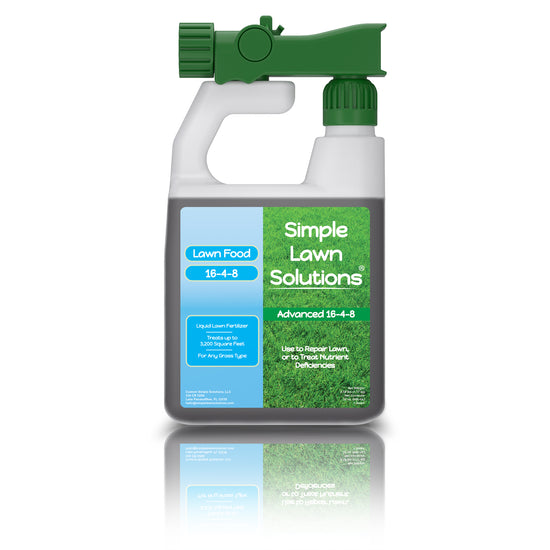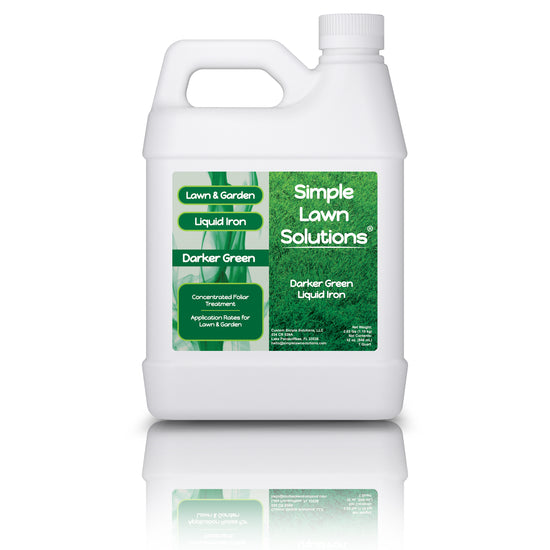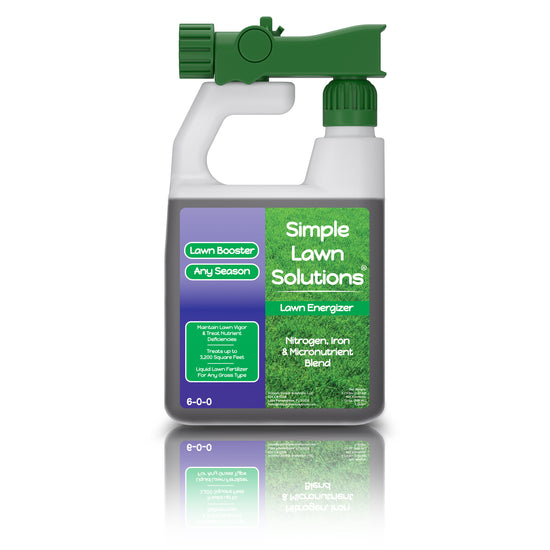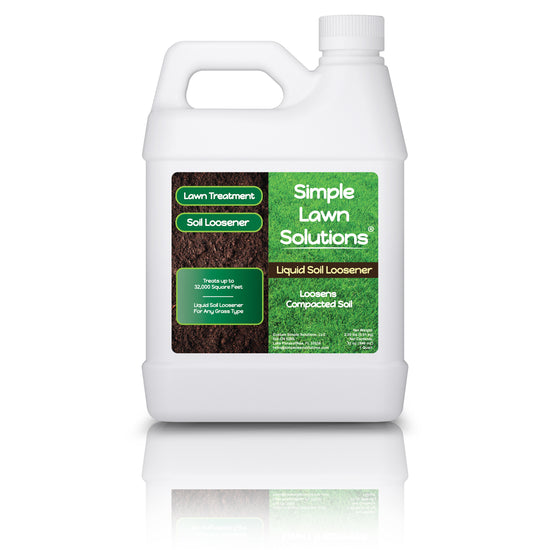When it comes to great lawn care, it all comes down to roots. A luscious lawn is an extension of happy, healthy soil. If your lawn is suffering or not looking its best, it is time to get to the root of any issues that may be occurring in your soil. When it comes to re-establishing nutrients and improving soil structure, organic fertilizers are an excellent option to consider to revive your lawn. With this deep dive into all things organic fertilizers, you will be equipped with the knowledge and products to correctly care for your lawn.
You don't have to be an expert in lawn care to fix your grass issues - let your friends at Simple Lawn Solutions help guide the way. Whether it's an understanding of proper nutrient care, liquid fertilizer, or aeration, we are here to help you achieve the best lawn on the block.
The Building Blocks of Soil Health: Macronutrients
The core of lawn fertilizer is macronutrients: nitrogen, phosphorus, and potassium. Lawn care products annotate these three macronutrients by using N-P-K. These nutrients are all part of the makeup that contributes to healthy soil.
Nitrogen helps to promote the growth and development of grass. Phosphorus can aid root vigor and Potassium plays a critical role in photosynthesis by aiding plants with the proper energy to create food material needed to grow. Potassium also facilitates protein production and water absorption, which are necessary for your grass's health.
Aside from conducting a soil test, the best way to check if your lawn might be lacking these essential macronutrients is to check for these physical signs:
- Yellowing blades or leaves
- Stunted, slow growth
- Poor density
- Thinning grass
- Brown spots
- Presence of weeds
- Patches

By understanding the critical nutrient makeup of lawn fertilizers, you will understand how you can nourish your soil naturally with the use of organic matter or synthetic materials. No matter which fertilizer you use, replenishing the macronutrients that are deficient in your soil will allow for healthy and growing grass. Learn more about the macronutrients you need for proper lawn care here and how you can combat deficiencies with liquid fertilizer.
Synthetic vs. Organic Fertilizers
With the makeup of either synthetic or organic materials, all fertilizer applications aim to assist in soil improvement and overall grass health. Organic materials naturally make up organic fertilizers. These types of organic fertilizers work to reuse materials, while synthetic fertilizers require the manufacturing of ingredients. One typical type of organic fertilizer comes from animal manure. The manure, and other types of organic fertilizers, are broken down by natural, biological processes and contain various living bacteria, microorganisms, and fungi that aid in nutrient uptake.
Synthetic fertilizers contain the macronutrients and none of these living organisms. Synthetic fertilizers aim to promote specific plant growth while organic fertilizers go deeper to nourish the soil, which is the source of all plant health. Depending on your lawn care needs and personal preference, you may choose an organic fertilizer over a synthetic fertilizer. No matter what type of fertilizer you’re looking for, you’ll be sure to find your fit with our best-selling collection of liquid fertilizers and lawn care products.
Types of Organic Fertilizers
As a biodegradable and renewable material, organic fertilizers are an excellent choice for those looking for more environmentally friendly lawn care. Since organic fertilizers are made up of materials that occur naturally, there are many different materials that you can use to fertilize your lawn, all of which contain beneficial ingredients such as microbes, bacteria, and fungi.
In this guide, we are going to break down these eight common types of organic fertilizers:

- Compost
- Manure
- Chelated Iron
- Liquid Seaweed
- Bone meal
- Alfalfa meal
- Cottonseed meal
Whether you prefer a dry or liquid fertilizer, the best way to ensure that your soil is healthy and nutrient-rich is by applying a nutrient-rich lawn treatment. If you’re interested in learning more, find out more ways to reuse organic material as lawn fertilizer. No matter which type of organic fertilizer you use, take pride in knowing that you are reusing matter for a secondary purpose of improving your lawn care.
Compost Fertilizer
When it comes to organic fertilizers, you can create lawn food in your backyard by composting. Composting refers to the matter created after combining vegetable matter, grass clippings, and leaves. After the decomposition, the organic material left behind is full of live, microbial goodness. Once applied to the soil, this matter works to restore the humus that works to nourish the grass.
Composting an organic fertilizer is one of the most practical and convenient ways to put your yard waste to fair use. You can use the compost as a spot treatment for your grass or apply it to the entire lawn once a year. Learn how you can start composting in your backyard today.
Manure Fertilizer
Animal manure fertilization is a practice that began many centuries ago and is used in the present day for good use. Traditionally used for farming, this technique reuses animal waste that contains nitrogen and other nutrients that are critical for healthy soil.
All animal manure can return to the earth for nourishment, but here are a few of the most common animal manures that we see:
- Cow
- Chicken
- Horse
- Goat
- Pig

Manure is best used in lawn fertilization when combined well with composting. On its own, manure contains high levels of salt, which can burn the soil. When the ideal mixture of manure and compost is created, it is best applied while the manure is still fresh. Nutrients are released into the ground as soil absorption occurs—these nutrients aid in enriching the ground.
Iron
Though it is not considered a vital soil macronutrient, iron is the fourth most prevalent nutrient found in soil and is a micronutrient. If your lawn is deficient in iron, consider adding these liquid fertilizer products that contain complexed iron:
- Micro Booster: Complexed Iron & Key Micronutrients
- Lawn Booster: Lawn Energizer Complexed Iron & Nitrogen Blend
Iron is a necessary micronutrient that is essential for photosynthesis and the creation of chlorophyll. Iron-deficient grass will show signs of interveinal yellowing, in severe cases, may even turn white.
Liquid Seaweed
Rivers and lakes act as a habitat for fish, plant life, and other water species that carry many nutrients through their waters. The nutrients found in liquid seaweed and other natural water-derived liquid fertilizer contain even more nutrients than land-based plants. The nutrients, microorganisms, and minerals found in liquid seaweed are readily available for grassroots absorption and uptake. This liquid fertilizer strengthens grassroots and promotes upward growth.
Liquid seaweed is a great lawn defender because of its bacteria content, which produces anti-fungal metabolites and other properties that ward off fungal diseases. Be careful when applying seaweed as a liquid fertilizer to your lawn as it is highly concentrated. Before application, dilute the liquid seaweed with water to avoid grass damage.
Bone Meal
There are so many nutrients found in animal bones. These animal bones can be used for organic fertilizers rich in phosphorus, a critical macronutrient for optimal soil nutrition. Animal bones are also high in protein. Bone meal is created by using animal bones or slaughterhouse waste and creating a course or fine ground. Before pulverization, these bones undergo a steaming process that sterilizes the bones.
Before applying bone meal to your lawn, have your soil tested for a full panel of nutrition results. With the results of your soil test, you can accurately treat your lawn for nutrient deficiencies. Here are seven reasons why you should be adding bone meal to your organic fertilizer lawn care routine.
Alfalfa Meal
If you're looking for a use for fermented alfalfa plants, see how this material can be used for lawn fertilization. Alfalfa meal is derived from alfalfa seeds, a plant product, so there's no messing around with animal waste or bones when it comes to doing it yourself. Alfalfa meal is made by drying out adult alfalfa plants and blending them into a fine powder. Traditionally used as feed for livestock, this meal can be pressed into pellets for lawn care applications.
Alfalfa meal has a naturally balanced blend of N-P-K, which are the three macronutrients in lawn fertilizers. Besides being a great source of micronutrients and minerals, alfalfa meal is excellent for improving moisture retention in your soil. If your lawn is too acidic, consider balancing out your soil's pH by applying an alkaline-rich fertilizer like alfalfa meal.
Cottonseed Meal
Organic fertilizers are the result of reusing by-product material that might otherwise have been discarded. Cottonseed meal is a slow-release organic fertilizer that is optimal for nitrogen-deficient lawns. This meal is the by-product of a material used in so many areas of our homes and lives: cotton. This type of fertilizer is created by extracting the seed oil from a cottonseed hull. What's left of the cottonseed meal is then processed and made into fertilizer form.
Cottonseed meal stands out amongst some other organic fertilizers because of its acidity. If your soil's pH is off and needs to be neutralized, consider applying a cottonseed meal to your lawn. Cottonseed meal encourages healthy grass by enhancing root development for a durable base.
How to Apply Organic Fertilizer

Organic fertilizers can exist in dry or liquid form. For the best use of dry fertilizers, mix well into the soil. The liquid fertilizer application is simple, with a direct application to the soil. Liquid fertilizer is absorbed into the roots after application and is an excellent choice for actively growing plants. If you are laying new seed or sod, you may want to consider mixing a dry fertilizer into the soil before any new grass growth to encourage long-term health.
From applying organic fertilizers to lawn aeration, there are so many benefits to liquifying your lawn care. Let’s learn why liquid fertilizers are optimal for fast results and even quicker nutrient absorption.
Organic Liquid Fertilizers
At Simple Lawn Solutions, liquid lawn care is our area of expertise - that’s why we carry organic and nourishing products like our Soil Hume, a soil treatment that contains seaweed, humic, and fulvic acid. This liquid fertilizer contains a blend of high-quality ingredients that contain organic carbon derived from a humate source. This liquid fertilizer contains naturally occurring minerals, carbons, and organic matter.
For another option, check out our Root Hume: Humic Fulvic Acid liquid fertilizer for an extraordinary and proprietary blend of humic acid that can increase the soil carbon and cation exchange capacity (CEC). The CEC of your soil can dictate which nutrient boosters are required, and what type of plants will grow well in a given soil environment.
The Lawn Care Experts
No matter what kind of liquid fertilizer you’re looking for, Simple Lawn Solutions carries various specially formulated lawn foods. Our liquid fertilizers are designed for fast results with well-mixed nutrients that quickly absorb into the soil. Whether your lawn requires an extra boost to grow taller, more durable blades or better root development, we have the right liquid fertilizer blend to help out your yard.
With our homogenous mixture of liquid fertilizer, you can easily apply and distribute nutrients to your lawn. By penetrating the soil on quick contact, these fertilizers enable your soil with the right nourishment to heal your soil's state and enhance your grass's look.
Are you interested in learning more about liquid fertilizer? Visit us online to check out more game-changing, liquid lawn care products.









